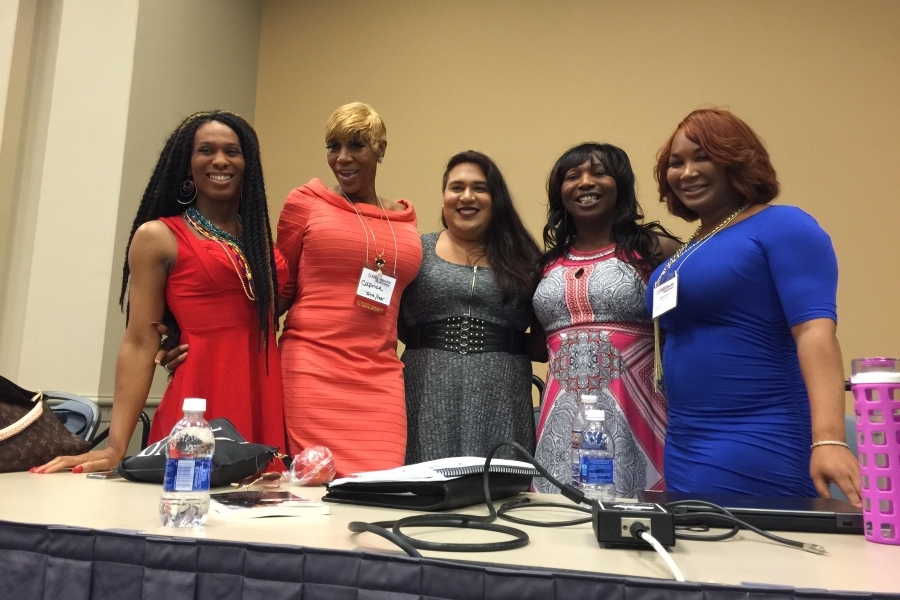Caprice Carthan had a motto to share with attendees of the 15th annual Trans-Health Conference, which kicked off June 9 at the Pennsylvania Convention Center.
“In your 20s, you should learn something,” she said. “In your 30s, you better know something. In your 40s, own something. By the time you’re in your 50s and older, give something back.”
Carthan, 60, serves on various community boards in her native Chicago and advocates for transgender women of color.
“There are five generations of trans experience up here right now,” she said by way of introduction for her fellow speakers on a panel called, “Heritage: Celebrating our History and Ancestors.”
Also speaking were Lexi Adsit, managing director of Peacock Rebellion in San Francisco, and Dane Figueroa Edidi, an author and performance artist. Lourdes Ashley Hunter, co-founder of the Trans Women of Color Collective in Washington, D.C., moderated.
Samantha Jo Dato, coordinator of the Trans-Health Conference through the Mazzoni Center, was on stage to announce the creation of the Charlene Arcila Pioneer Award, which was named in honor of one of the conference’s founders.
The following Philadelphia activists were nominated by peers in the LGBT community for the inaugural award: Charlotte White, Jayden Sampson, Chris Paige, Janis Stacy, Ja’Nae Tyler, Mister Chris Benjamin and A. Dionne Stallworth. The winner will be announced at 1 p.m. June 10 in room 119A of the convention center.
With more than 230 workshops, the Trans-Health Conference is free to attend. It runs through June 11.
The “Heritage” panelists each gave 10-minute speeches about their lives and journeys toward acceptance. A recurring theme was calling out the trans women on whose shoulders the current generation stands.
Audience members shouted out Arcila and Nizah Morris, who was found dead in 2002 after taking a courtesy ride with a Philadelphia police officer. The incident remains unsolved.
“Since the beginning of time, transgender, gender-nonconforming, two-spirit individuals have been essential to culture,” Lourdes said. “We have continued to place our identities and bodies on the line at the forefront of social justice movements.”
Adsit recalled Compton’s Cafeteria Riot of 1966, an early transgender protest that will celebrate its 50th anniversary in August. She concluded her talk by naming trans elders who had an impact on her, including Miss Major Griffin-Gracy, Sylvia Rivera and Marcia P. Johnson among others.
“I feel like I’m a part of a warrior queen legacy,” Adsit said.
Edidi celebrated her Nigerian and Cuban ancestry with a Yoruba song.
The kickoff of the Trans-Health Conference coincided with the second-annual raising of the trans Prideflag on the northeast corner of Philadelphia City Hall. It will remain there through the end of Pride weekend.
A couple-dozen people from the conference walked to City Hall for the raising of the flag, which was made at Humphrys Flag Co. in Old City. More than 50 people in all attended the event.
“I continue to show up as the city shows up for us,” said Dato with the Trans-Health Conference.
“The trans flag raising symbolizes so much in Philadelphia,” she added. “We’re here. We’re not being ignored. They’re intentionally seeing us and working with us.”
Nellie Fitzpatrick, director of the city Office of LGBT Affairs, noted that Philadelphia was the home of Betsy Ross, the designer of the first flag of the United States. She said the trans pride flag fits nicely into that tradition.
“It will fly over the city of Philadelphia, ensuring our city and society embraces each and every transgender life,” she said. “The historic city of Philadelphia is where life, liberty and the pursuit of happiness were first pledged as a right to all citizens.”

